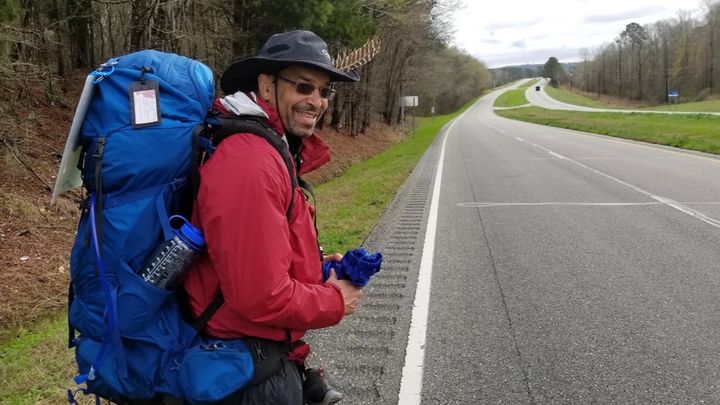
Commemorating Northern Ireland Civil Rights
"Nonviolence is noncooperation with evil. Nonviolence examines history and the human condition; it dissects issues, speaks truth to power, and develops a strategy to arrive at humane solutions, including policies. Nonviolence is active and courageous." ~ Martin L. King, Jr.

This year will mark the 50th Anniversary of the 1969 People's Democracy March from Belfast to Derry, in Northern Ireland.
Follow me on my next Walk to Freedom journey, to Northern Ireland, in April, as the Amherst Irish Association’s 2018 Margaret Maher Award recipient.
In Ulster, I will be:
● Commemorating the 1969 People's Democracy March by retracing the steps of the original Civil Rights marchers from Belfast to Derry, about 114 km (70 miles)
● Reflecting on how the People's Democracy March was modeled on the 1965 Selma to Montgomery Right to Vote March led by Dr. Martin L. King, Jr.
● Learning how this march galvanized the political "Troubles" of Northern Ireland when peaceful civil rights protesters were ambushed and attacked by Ulster loyalist mobs and part-time B-Specials with rocks, wooden cudgels, iron bars, and bottles as they neared the Burntollett Bridge outside of Londonderry.
● Talking to people born before and after the “Troubles” to learn about their concerns for peace today.
With the winds of time at our back, we know the Civil Rights struggle for nonviolence lost out to the more militant voices heard across Northern Ireland. While retracing the original march route, I hope to learn why Truth and Reconciliation after 30 years is in peril today as the Brexit deadline nears.
To accomplish this undertaking, I am asking friends who are interested in learning more about the Northern Ireland Civil Rights Movement, at a critical 50 year mark in time, through my Walk to Freedom journey, to consider donating $50, $100, or more to help me reach my goal of raising $4,000 to cover necessary camping and hiking equipment, hotel rooms for when sleeping outdoors is not possible, meals, recording equipment, and communication and transportation expenses. The Amherst Irish Association is providing airfare.
The walk will start in Belfast on April 10, the anniversary of the Good Friday Agreement, and include stops in Antrim, Randalstown, Hillhead, Toome, Gulladuff, Brackagh, Glen Shane, Dungiven, Feeney, Claudy, Burntollet Bridge, Altnagelvin, Irish Street, Spencer Road, Crossing of Foyle River, and conclude at Free Derry.

Lastly, I look forward to learning about Ireland's myths, legends, and stories of its magnificent culture.

This year will mark the 50th Anniversary of the 1969 People's Democracy March from Belfast to Derry, in Northern Ireland.
Follow me on my next Walk to Freedom journey, to Northern Ireland, in April, as the Amherst Irish Association’s 2018 Margaret Maher Award recipient.
In Ulster, I will be:
● Commemorating the 1969 People's Democracy March by retracing the steps of the original Civil Rights marchers from Belfast to Derry, about 114 km (70 miles)
● Reflecting on how the People's Democracy March was modeled on the 1965 Selma to Montgomery Right to Vote March led by Dr. Martin L. King, Jr.
● Learning how this march galvanized the political "Troubles" of Northern Ireland when peaceful civil rights protesters were ambushed and attacked by Ulster loyalist mobs and part-time B-Specials with rocks, wooden cudgels, iron bars, and bottles as they neared the Burntollett Bridge outside of Londonderry.
● Talking to people born before and after the “Troubles” to learn about their concerns for peace today.
With the winds of time at our back, we know the Civil Rights struggle for nonviolence lost out to the more militant voices heard across Northern Ireland. While retracing the original march route, I hope to learn why Truth and Reconciliation after 30 years is in peril today as the Brexit deadline nears.
To accomplish this undertaking, I am asking friends who are interested in learning more about the Northern Ireland Civil Rights Movement, at a critical 50 year mark in time, through my Walk to Freedom journey, to consider donating $50, $100, or more to help me reach my goal of raising $4,000 to cover necessary camping and hiking equipment, hotel rooms for when sleeping outdoors is not possible, meals, recording equipment, and communication and transportation expenses. The Amherst Irish Association is providing airfare.
The walk will start in Belfast on April 10, the anniversary of the Good Friday Agreement, and include stops in Antrim, Randalstown, Hillhead, Toome, Gulladuff, Brackagh, Glen Shane, Dungiven, Feeney, Claudy, Burntollet Bridge, Altnagelvin, Irish Street, Spencer Road, Crossing of Foyle River, and conclude at Free Derry.

Lastly, I look forward to learning about Ireland's myths, legends, and stories of its magnificent culture.
Organizer
Ken Johnston
Organizer
Amherst, MA